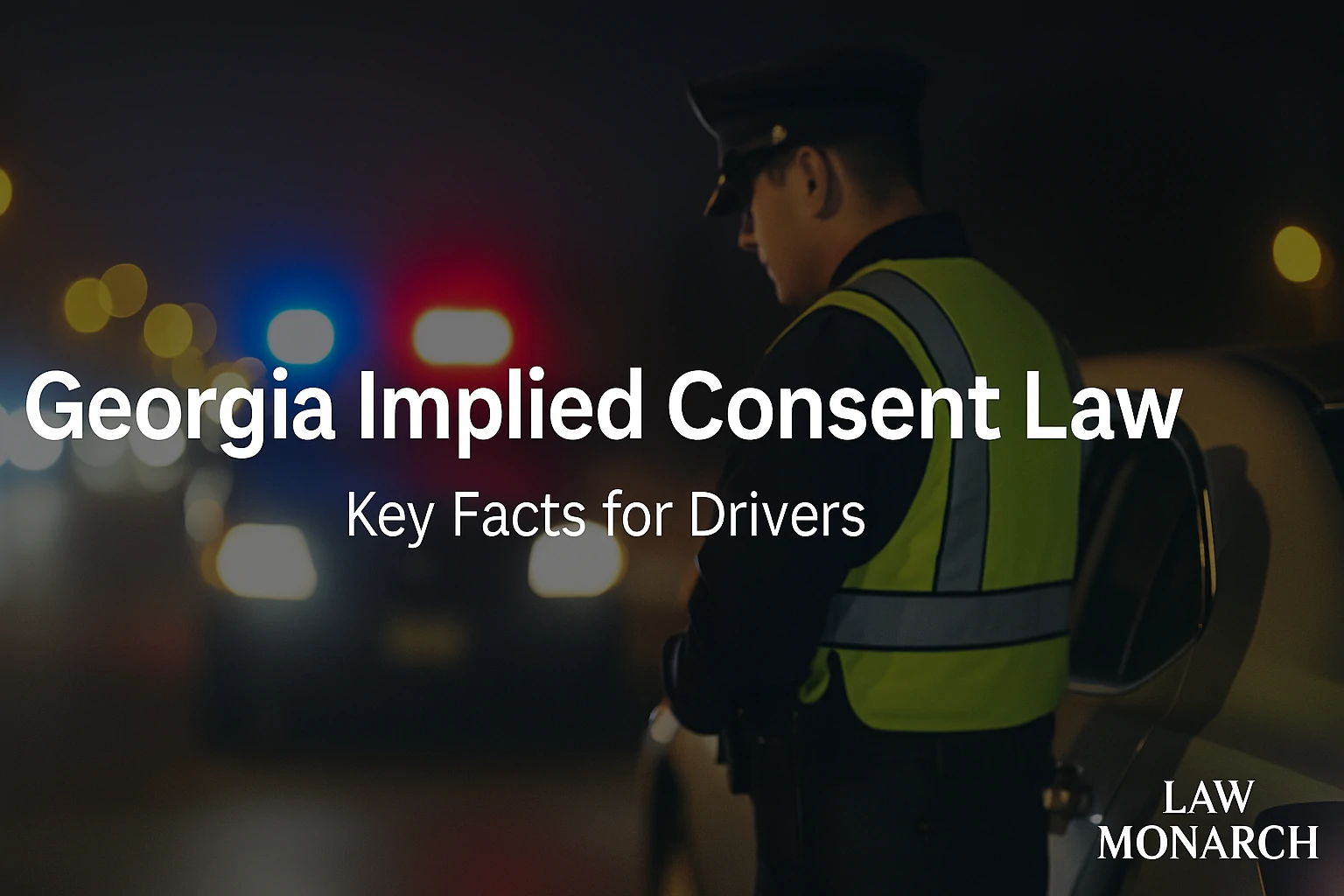Driving in Georgia involves more than speed limits or traffic lights. The state enforces rules that reach beyond standard driving laws. One of the most important is the Georgia Implied Consent Law. This rule can change a person’s future after a DUI arrest. Many drivers only learn about it when it is too late.
This law is not just a legal term. It touches real lives every day. When police stop a driver and suspect alcohol or drug use, this law takes effect. Understanding it can protect your license, your rights, and your future.
Knowing this law before trouble begins gives you an advantage. It helps you make clear choices under stress. Knowledge of this law is not optional. It is a key part of safe and responsible driving in Georgia.
How the Georgia Implied Consent Law Works
The Georgia Implied Consent Law means that every driver agrees to chemical testing the moment they drive on Georgia roads. You do not sign a paper or give verbal approval. The consent is automatic under state law.
If an officer arrests a driver for DUI, the officer can request a breath, blood, or urine test. The purpose is to measure alcohol or drugs in the driver’s system. Refusal does not prevent the officer from charging the driver with DUI. It only adds more penalties to the case.
This law also covers drugs, not just alcohol. Even prescription drugs that impair driving can lead to a test request. Georgia treats any form of impaired driving seriously.
Situations That Trigger the Law
This law does not apply to every traffic stop. Police must first have a clear reason to pull over a driver. Actions such as swerving, speeding, or running a red light can give them probable cause. Once they have that, they may investigate further.
If police believe a driver is impaired, they read the implied consent notice. This notice explains the driver’s rights and the penalties for refusal. At that point, the driver must decide.
The choice to take or refuse the test is critical. Many drivers face this decision under pressure without fully knowing the consequences.
Penalties for Refusing a Test
A refusal triggers automatic penalties. The most common penalty is a one-year license suspension. This suspension happens even if the DUI case has not gone to trial.
A refusal can also be used in court. Prosecutors may argue that a driver refused because they feared the results. This argument often hurts the defense.
In some cases, police may even get a warrant to draw blood. That means refusal does not always stop testing. It only adds another problem on top of the DUI charge.
Consequences of Taking the Test
Taking the test can also lead to serious results. A blood alcohol concentration (BAC) of 0.08% or higher usually leads to a DUI charge. For commercial drivers, the limit is 0.04%. For drivers under 21, it is 0.02%.
If you fail the test, you face fines, license suspension, and possibly jail. A first offense is serious, but repeat offenses bring even harsher penalties. Georgia law does not treat DUI lightly.
Even if you pass the test, the process can still be stressful. An arrest record, legal fees, and time in court can follow you for months.
Your Right to an Independent Test
Drivers in Georgia have the right to request their own test after taking the state test. You can choose a qualified professional and pay for a separate blood or urine test.
This independent test can help challenge the state’s evidence. It must happen quickly. Any delay can weaken its value. Drivers should make the request clearly and without hesitation.
Independent tests often become a key part of a defense strategy. They can prove that the original test was flawed or inaccurate.
The Administrative License Suspension
The Georgia Department of Driver Services can suspend your license through an administrative process. This is different from the criminal case. If you fail or refuse a test, the officer will take your license and give you a temporary permit.
You have only 30 days to request a hearing. Missing this deadline means an automatic suspension. Many drivers lose their license simply because they do not act in time.
This hearing is your chance to fight for your license. It is separate from the DUI trial and focuses only on the license issue.
Common Defenses Against the Law
Drivers have options if they face a case under this law. One defense is to argue that the officer did not follow proper procedure. If the officer failed to read the implied consent notice correctly, the test results may be invalid.
Another defense is to challenge the accuracy of the testing equipment. Faulty machines or improper handling of samples can create errors.
Every case is different. A skilled DUI attorney can study the facts and find the best defense.
Why This Law Matters to Every Driver
The Georgia Implied Consent Law is not only for people who drink. It affects everyone who drives. A single stop can lead to a chain of events that change your daily life. Losing your license can cost you your job. It can make it hard to care for your family. It can even affect your reputation.
Learning this law is not about fear. It is about preparation. When you understand it, you avoid mistakes that many drivers make under stress.
Q. What happens if a driver refuses a test under this law?
Refusing a test leads to a license suspension that can last up to one year. The refusal may also be used as evidence in court. Police can still get a warrant for a blood test, which can make the case more serious.
Q. How soon does the implied consent law apply after an arrest?
The law takes effect right after a legal DUI arrest. Police must read the implied consent notice to the driver. This notice explains the driver’s rights and the penalties for refusing a test.
Q. Can a driver request a different type of test?
A driver can ask for another test from a qualified professional of their choice. They must pay for this test. The test requested by police must still be completed first.
Q. Does the implied consent law apply only to alcohol?
The law applies to alcohol and drugs. It includes illegal drugs, prescription medicine, and any substance that affects a driver’s ability to drive safely.
Q. What should a driver do if they believe the test result is wrong?
A driver can challenge the result in court. They may also provide evidence from an independent test. A skilled DUI attorney can help them build a strong defense.
Key Points Drivers Should Know
The Georgia Implied Consent Law means that driving in Georgia carries more responsibility than many people realize. It gives police the right to request chemical tests and punish refusal. It affects drivers who take the test and fail. It even affects those who do not understand their right to a hearing or an independent test.
You can avoid the worst outcomes if you learn the law before you face a DUI stop. Knowledge is the strongest defense. It can protect your license, your record, and your future.
If you live in Georgia or drive through the state, understand this law. Prepare yourself now so you do not face painful surprises later.
Disclaimer
This article is for general information only. It does not provide legal advice. DUI laws in Georgia may change, and every case is different. Speak with a licensed Georgia DUI attorney for guidance about your specific situation.




